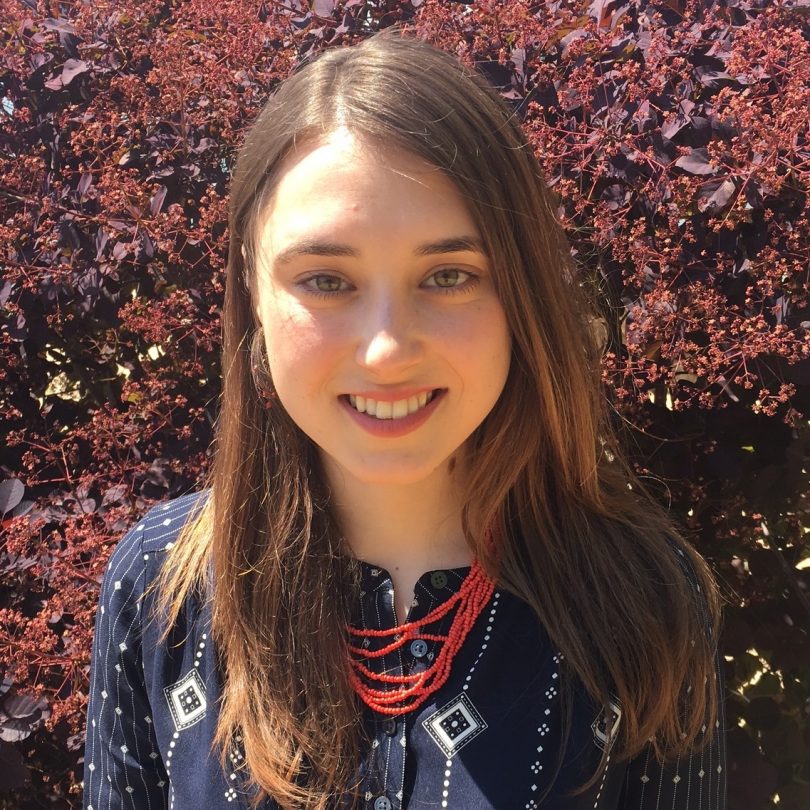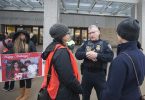By Samata Joshi
BU News Service
BOSTON – Two years after 9/11, a tipping point in immigration policy-making led to the establishment of the U.S. Citizenship and Immigration Services (USCIS) under the Department of Homeland Security. The same year, Kostadin Haralampiev, along with 2,842 other Bulgarians, won a green card from a pool of 6.2 million entries in the diversity immigrant visa program.
His daughter, Violeta, was 18 years old when she joined him in Norwood, Mass., along with her younger sister and mother, to live the American dream.
Violeta Haralampieva, 30, now works as an asylum lawyer for the Political Asylum/ Immigration Representation (PAIR) Project, a not-for-profit in Boston. A 2016 Boston University Law Public Service Fellow, Haralampieva is one of six staff attorneys at PAIR who provide pro bono services to asylum-seekers and unjustly detained non-citizens in Massachusetts.
“This is my dream job,” she said smiling, looking around the office.
The entrance welcomes its visitors with a trilingual sign in Spanish, English and Arabic: “No matter where you are from, we’re glad you’re our neighbor!”
Inside, the reception faces a mantle full of thank you cards from clients. Haralampieva’s corner office is on a mezzanine floor. The room to its right lies empty and identical. There’s little activity outside her office-cubicle. Most of the staff are either in court or giving PAIR’s “Know Your Rights” (KYR) presentation elsewhere in the city.
She’s wrapped in a dark purple cardigan with jeans, her hair falling on her shoulders carefully. The chair she’s sitting in is too big for her small body, making her look like a teenager. Her upright posture manages to capture the weight of her experiences, adding years to her words. The last few weeks have been stressful. She’s been meeting with her client every day to prepare for an asylum interview, her first full representation case.
“It’s difficult, emotionally and mentally, to experience their stories over and over again,” Haralampieva said, smile still in place.
Her voice is melodious, coupled with a heavy accent. It is as if she’s speaking a different language altogether. Haralampieva belongs to a family of musicians. She played the flute for years and enjoys singing, but pursuing music as a career path was never in the cards, said her younger sister, Gergana, a violinist.
“It wasn’t surprising for my family at all that Violeta chose to go to law school,” Gergana said. “She is a nurturer. Even while growing up, she was like my second mama! That’s who she is. She wants to help the people she cares about and loves.”
Haralampieva was only 3 when her family moved to then Czechoslovakia (modern day Czech Republic) from Plovdiv, Bulgaria, for work opportunity as musicians. This was around the same time as the fall of the Soviet Union which left Europe with a refugee crisis for the first time. From her parents’ stories and memories, she remembers the anti-immigrant rhetoric that plagued Czech at the time.
“They were easily targeted because of their accents,” Haralampieva said. “Their bags were checked at grocery stores to see if they were stealing. … It was quite disturbing.”
But America welcomed them. As an immigrant, Haralampieva was taught never to take opportunities in her host country for granted and to remember and respect where she came from.
“Having moved around so much and knowing how my parents were treated, I always felt like an immigrant in Czech,” Haralampieva said. “After moving to America, I can proudly say that I am an American and a Bulgarian.”
She understands her privilege to make that statement.
“We weren’t undocumented, plus we were European and white,” Haralampieva said. “I am mindful that these are the reasons why it was easy to get accepted in the U.S.”
Haralampieva’s own stories in Bulgaria, Czech, and a unique experience studying cultural anthropology at UMass Boston, brought her closer to realizing that she wanted to work with immigrants. She was part of the Latino Leadership Opportunity Program while at UMass, which helped students understand and deal with problems the Latin American immigrant community was facing.
“When I heard stories of their challenges and struggles, I started comparing it to my story,” Haralampieva said. “I realized how random, and maybe even easy, it was to get our green cards. That pushed me to think how I can help this community get the opportunity I did.”
In her second year at BU School of Law, as part of the university’s International Human Rights Clinic, Haralampieva visited India. Professor Susan Akram, director of the clinic, as well as one of the early co-founders of PAIR, said it was after this trip Haralampieva confessed to her how life changing the experience had been.
In India, Haralampieva interviewed Tibetans, documenting their stories and living conditions as refugees.
“It was a transformative experience for someone like her, who was eager to get hands-on experience and see practically the difference our work makes,” Akram said. “We need people like [Haralampieva] to stay in public service to help solve the international human rights and refugee crisis we’re facing.”
Heather Pérez, a fellow staff attorney at PAIR, said to be an effective immigration lawyer, you need to have two strong qualities.
“You have to be intelligent and compassionate,” Pérez said. “Both of those things you’ll find in [Haralampieva].”
Pérez and Haralampieva have been co-counseling on a case of a client who is trying to escape violence in their home country, El Salvador, and seeking asylum in the U.S. for over six months now.
“[Haralampieva] is the kind of person who will explore the issue from every angle and find a solution,” Pérez said. “Empathy is one of her strong pursuits, which makes her the best advocate for her clients who really need it.”
After graduating from law school, Haralampieva had the chance to travel to Sofia, Bulgaria, as BU’s Public Service Fellow and see how the country was grappling with its emerging refugee law.
“Witnessing xenophobia, prejudice, and racism first hand was sobering,” she said.
She moved to New York for six months after this to research on international refugee rights with the Refugee Solidarity Network after the experiences she had.
Travel was always a thrilling experience for her sister, said Gergana, who traveled with Haralampieva to Spain only recently. But these travel experiences to India and Bulgaria shaped her thought process and gave her more perspective.
“It was necessary for her to travel to these realities to find ways to deal with the complexities of her job,” Gergana said.
The current administration nationally is making it difficult for Haralampieva to do her job and help other families she said.
“It’s painful to deal with these everyday heartless, mindless policies that, honestly, make no sense,” Haralampieva said. “There are certain people in the administration who are very xenophobic, racist and anti-Muslim … Every day, we have DACA recipients calling in a panic, asking ‘what are we going to do?’”
President Trump has created hysteria around the immigrant community, Haralampieva said.
“Take, for example, how Trump used the NYC bomber’s immigration history to label an entire community of immigrants as terrorists,” Haralampieva said. “My family came here with the help of the diversity visa too, and we are not terrorists!”
Trump hasn’t shaken her belief in the American system though.
“The basic structure that exists in the U.S. is ingenious in terms of the Constitution and the separation of power,” Haralampieva said. “I definitely want to fight to preserve what is good. We need to open dialogue and discussions, without limiting anybody’s ability to speak, even if it’s very painful. I want to find ways to help people think critically and that’s my goal.”
Haralampieva’s idea of America is what “Dreamers” want from America. Because for her, being American means accepting diversity.
“America is not a country based on your genetic background but based on ideas that are bigger than where you come from, the color of your skin or the language you speak at home,” Haralampieva said. “This is what makes America so unique or even ‘great,’ if you please. If that was to go away, then how would America be any different from the rest of the world?”





